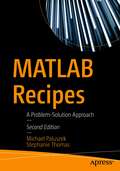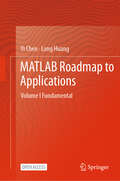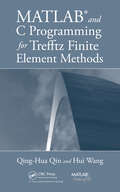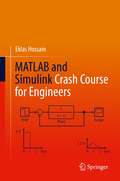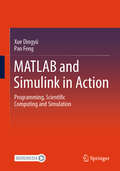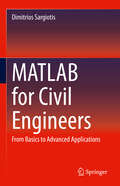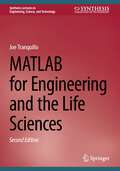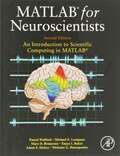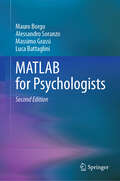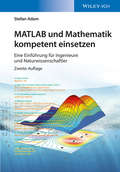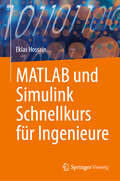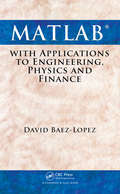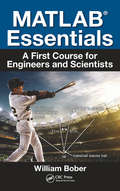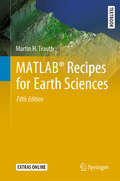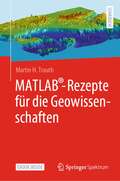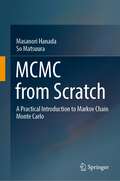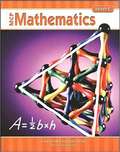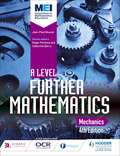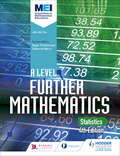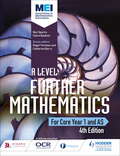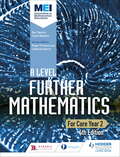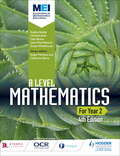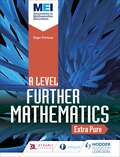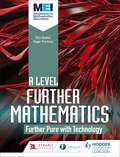- Table View
- List View
MATLAB Recipes: A Problem-Solution Approach
by Stephanie Thomas Michael PaluszekLearn from state-of-the-art examples in robotics, motors, detection filters, chemical processes, aircraft, and spacecraft. With this book you will review contemporary MATLAB coding including the latest MATLAB language features and use MATLAB as a software development environment including code organization, GUI development, and algorithm design and testing. Features now covered include the new graph and digraph classes for charts and networks; interactive documents that combine text, code, and output; a new development environment for building apps; locally defined functions in scripts; automatic expansion of dimensions; tall arrays for big data; the new string type; new functions to encode/decode JSON; handling non-English languages; the new class architecture; the Mocking framework; an engine API for Java; the cloud-based MATLAB desktop; the memoize function; and heatmap charts. MATLAB Recipes: A Problem-Solution Approach, Second Edition provides practical, hands-on code snippets and guidance for using MATLAB to build a body of code you can turn to time and again for solving technical problems in your work. Develop algorithms, test them, visualize the results, and pass the code along to others to create a functional code base for your firm. What You Will Learn Get up to date with the latest MATLAB up to and including MATLAB 2020bCode in MATLAB Write applications in MATLAB Build your own toolbox of MATLAB code to increase your efficiency and effectiveness Who This Book Is For Engineers, data scientists, and students wanting a book rich in examples using MATLAB.
MATLAB Roadmap to Applications: Volume I Fundamental
by Yi Chen Long HuangThis open access book presents a comprehensive guide to MATLAB programming, catering to students, engineers, and researchers seeking to harness MATLAB as a powerful tool for their work. The text meticulously covers fundamental concepts, progressing from basic elements such as types and operators to more complex structures like arrays and matrices. It elucidates key programming constructs including selection statements, loop structures, scripts, and functions, providing readers with a solid foundation in MATLAB programming. The book's structure is carefully crafted to facilitate step-by-step learning, with each chapter building upon previous knowledge. Abundant examples and exercises reinforce understanding, while dedicated sections on data visualisation, algorithm development, and practical applications in engineering, science, and finance demonstrate MATLAB's versatility across disciplines. A distinguishing feature of this volume is its inclusion of laboratory work and coursework, allowing readers to apply theoretical concepts to real-world scenarios. This hands-on approach enhances the learning experience and prepares users for practical implementation of MATLAB in their respective fields. In the current era of artificial intelligence, this book serves as an essential resource for those seeking to leverage MATLAB's capabilities. It not only equips readers with programming skills but also illustrates how MATLAB can be integrated into cutting-edge research and industry applications.
MATLAB and C Programming for Trefftz Finite Element Methods
by Qing-Hua Qin Hui WangAlthough the Trefftz finite element method (FEM) has become a powerful computational tool in the analysis of plane elasticity, thin and thick plate bending, Poisson's equation, heat conduction, and piezoelectric materials, there are few books that offer a comprehensive computer programming treatment of the subject. Collecting results scattered in t
MATLAB and Simulink Crash Course for Engineers
by Eklas HossainMATLAB and Simulink Crash Course for Engineers is a reader-friendly introductory guide to the features, functions, and applications of MATLAB and Simulink. The book provides readers with real-world examples, exercises, and applications, and offers highly illustrated, step-by-step demonstrations of techniques for the modelling and simulation of complex systems. MATLAB coverage includes vectors and matrices, programs and functions, complex numbers, visualization, solving equations, numerical methods, optimization problems, and graphical user interfaces. The Simulink coverage includes commonly used Simulink blocks, control system simulation, electrical circuit analysis, electric power systems, power electronics, and renewable energy technology. This powerful tutorial is a great resource for students, engineers, and other busy technical professionals who need to quickly acquire a solid understanding of MATLAB and Simulink.
MATLAB and Simulink in Action: Programming, Scientific Computing and Simulation
by Dingyü Xue Feng PanThe textbook is intended for teaching MATLAB language and its applications. The book is composed of three parts: MATLAB programming, scientific computing with MATLAB, and system simulation with Simulink. Since MATLAB is widely used in all fields of science and engineering, a good introduction to the language can not only help students learn how to use it to solve practical problems, but also provide them with the skills to use MATLAB independently in their later courses and research. The three parts of the book are well-balanced and tailored to the needs of engineering students, and the mathematical problems commonly encountered in engineering can be easily solved using MATLAB. This textbook is suitable for undergraduate and graduate students majoring in science and engineering.
MATLAB for Civil Engineers: From Basics to Advanced Applications
by Dimitrios SargiotisThis book is a comprehensive and rigorous guide to MATLAB for Civil Engineers, bridging the critical gap between theoretical mathematics and practical engineering solutions. With an approachable introduction for students and deep insights for experienced professionals, it caters to a wide range of audiences across civil engineering disciplines—environmental, structural, geotechnical, and transportation engineering. Structured to guide readers progressively, the book begins with foundational MATLAB operations such as syntax and matrix manipulation, then advances into sophisticated engineering applications, including optimization, numerical methods, and data visualization. It covers essential MATLAB functionalities, offering detailed instruction on computation, visualization, and programming, all within the context of solving real-world engineering challenges. What sets this book apart is its hands-on approach. Readers are immersed in practical learning through real-world case studies, examples, and step-by-step exercises designed to reinforce key concepts. The text provides both academic and professional readers with the tools they need to model, analyze, and optimize engineering systems using MATLAB, ensuring they are equipped to handle both routine and complex engineering challenges with confidence. By the end, readers will not only master MATLAB's powerful tools but will also understand how to apply them directly to critical civil engineering problems, positioning themselves to innovate and lead in a field where computational proficiency is increasingly essential.
MATLAB for Engineering and the Life Sciences (Synthesis Lectures on Engineering, Science, and Technology)
by Joe TranquilloThis book is a self-guided tour of MATLAB for engineers and life scientists. It introduces the most commonly used programming techniques through biologically inspired examples. Although the text is written for undergraduates, graduate students and academics, as well as those in industry, will find value in learning MATLAB. The book takes the emphasis off of learning syntax so that the reader can focus more on algorithmic thinking. Although it is not assumed that the reader has taken differential equations or a linear algebra class, there are short introductions to many of these concepts. Following a short history of computing, the MATLAB environment is introduced. Next, vectors and matrices are discussed, followed by matrix-vector operations. The core programming elements of MATLAB are introduced in three successive chapters on scripts, loops, and conditional logic. The last three chapters outline how to manage the input and output of data, create professional quality graphics and find and use MATLAB toolboxes. Throughout, biomedical and life science examples are used to illustrate MATLAB's capabilities.
MATLAB for Neuroscientists: An Introduction to Scientific Computing in MATLAB
by Pascal Wallisch Michael E. Lusignan Marc D. Benayoun Tanya I. Baker Adam Seth Dickey Nicholas G. HatsopoulosMATLAB for Neuroscientists serves as the only complete study manual and teaching resource for MATLAB, the globally accepted standard for scientific computing, in the neurosciences and psychology. This unique introduction can be used to learn the entire empirical and experimental process (including stimulus generation, experimental control, data collection, data analysis, modeling, and more), and the 2nd Edition continues to ensure that a wide variety of computational problems can be addressed in a single programming environment. This updated edition features additional material on the creation of visual stimuli, advanced psychophysics, analysis of LFP data, choice probabilities, synchrony, and advanced spectral analysis. Users at a variety of levels―advanced undergraduates, beginning graduate students, and researchers looking to modernize their skills―will learn to design and implement their own analytical tools, and gain the fluency required to meet the computational needs of neuroscience practitioners.
MATLAB for Psychologists
by Alessandro Soranzo Mauro Borgo Massimo GrassiThe matrix laboratory interactive computing environment--MATLAB--has brought creativity to research in diverse disciplines, particularly in designing and programming experiments. More commonly used in mathematics and the sciences, it also lends itself to a variety of applications across the field of psychology. For the novice looking to use it in experimental psychology research, though, becoming familiar with MATLAB can be a daunting task. MATLAB for Psychologists expertly guides readers through the component steps, skills, and operations of the software, with plentiful graphics and examples to match the reader's comfort level. Using an extended illustration, this concise volume explains the program's usefulness at any point in an experiment, without the limits imposed by other types of software. And the authors demonstrate the responsiveness of MATLAB to the individual's research needs, whether the task is programming experiments, creating sensory stimuli, running simulations, or calculating statistics for data analysis. Key features of the coverage: Thinking in a matrix way.Handling and plotting data.Guidelines for improved programming, sound, and imaging.Statistical analysis and signal detection theory indexes.The Graphical User Interface.The Psychophysics Toolbox.MATLAB for Psychologists serves a wide audience of advanced undergraduate and graduate level psychology students, professors, and researchers as well as lab technicians involved in programming psychology experiments.
MATLAB for Psychologists
by Alessandro Soranzo Mauro Borgo Massimo Grassi Luca BattagliniThe second edition of this textbook provides a comprehensive and detailed overview of MATLAB and specific tools for creating experiments and analysing data in psychology. In addition to an enhanced focus on connections with external devices and writing experiments, all chapters have been thoroughly revised and updated to provide the latest information and examples compatible with the most recent versions of MATLAB. All scripts have been tested to ensure a reliable and exact response. In addition, the book provides detailed examples of classic experiments (e.g., the Posner task) as well as recommendations for structuring and implementing ad hoc experiments. Each chapter is accompanied by several illustrations, examples, and code to match every reader's expertise and comfort level. This concise volume demonstrates MATLAB’s responsiveness to individuals’ research needs, whether the task is programming experiments, creating sensory stimuli, running simulations, or calculating statistics for data analysis. Key areas of coverage include: Thinking in a matrix way. Handling and plotting data. Guidelines for improved programming, sound, and imaging. Statistical analysis and signal detection theory. Psychophysics Toolbox and its use in connection with external devices. MATLAB for Psychologists, Second Edition, serves a wide audience of advanced undergraduate and graduate level psychology students, professors, and researchers as well as lab technicians and other professionals involved in programming psychology experiments.
MATLAB und Mathematik kompetent einsetzen: Eine Einführung für Ingenieure und Naturwissenschaftler
by Stefan AdamDas erfolgreiche MATLAB- und Mathematikbuch von Stefan Adam fördert den Aufbau einer fundierten Kompetenz zur Lösung von naturwissenschaftlichen und technischen Berechnungsproblemen. Zusammen mit den Erläuterungen zur Anwendung und Programmierung vom MATLAB wird immer auch ein tiefer Einblick vermittelt in die dahinter stehenden mathematischen Zusammenhänge. Durch viele Beispiele, Übungen und selbst zu erstellende Demonstrationsprogramme wird der Leser angeleitet, sich in der Umgebung von MATLAB kreativ zu bewegen. Das von einem MATrix-LABoratorium ausgegangene Softwarepaket hat sich längst zu einem Mathematik-Laboratorium weiterentwickelt, das weltweit an Universitäten sowie in Forschungs- und Entwicklungsabteilungen eine Spitzenstellung einnimmt. Die zwei Komponenten dieses Buches verstärken sich gegenseitig. Der mathematische Hintergrund fördert einerseits die Merkfähigkeit für die Programmierstrukturen sowie die Entscheidungskompetenz zur Auswahl des besten Berechnungsablaufes. Selbstprogrammierte Lösungsverfahren mit vielfältigen grafischen Darstellungen vertiefen andererseits das Verständnis für oft abstrakte mathematische Zusammenhänge. Für das Arbeiten mit diesem Buch werden weder Vorkenntnisse einer Programmiersprache noch solche zu MATLAB benötigt. Mathematische Themen starten auf dem Niveau, das etwa ein Jahr vor dem Abitur erreicht wird, und steigen in sanften Stufen bis zu den Anforderungen der ersten vier Semester eines Naturwissenschafts- oder Ingenieurstudiums. Starke Querbezüge zu praktischen Problemen und hilfreiche bildhafte Vorstellungen machen die hier präsentierte Mathematik leichter verdaulich. Merkpunkte, Checklisten und Selbst-Tests dienen der Festigung der erworbenen Fähigkeiten und machen das Buch auch hervorragend zum Selbststudium geeignet. * In dieser zweiten Auflage können Teile des ersten Kapitels als MATLAB Crash-Kurs für Ungeduldige oder für Wiedereinsteiger dienen. * Hinweise auf Anwendungen der Toolbox zum Symbolischen Rechnen, also zum Bestimmen einer analytischen Lösung oder zum Umsetzen von Formeln, finden sich über das ganze Buch verteilt. * Im Internet ist unter www.wiley-vch.de/textbooks/ eine Fülle von ergänzendem Material erhältlich
MATLAB und Simulink Schnellkurs für Ingenieure
by Eklas HossainMATLAB und Simulink Schnellkurs für Ingenieure ist ein benutzerfreundlicher Einführungsführer zu den Funktionen und Anwendungen von MATLAB und Simulink. Das Buch bietet Lesern praxisnahe Beispiele, Übungen und Anwendungen und zeigt hochillustrierte, schrittweise Demonstrationen von Techniken für die Modellierung und Simulation komplexer Systeme. Die MATLAB-Abdeckung umfasst Vektoren und Matrizen, Programme und Funktionen, komplexe Zahlen, Visualisierung, Lösung von Gleichungen, numerische Methoden, Optimierungsprobleme und grafische Benutzeroberflächen. Die Simulink-Abdeckung umfasst häufig verwendete Simulink-Blöcke, Simulation von Regelungssystemen, Analyse elektrischer Schaltungen, elektrische Energiesysteme, Leistungselektronik und erneuerbare Energietechnologien. Dieses leistungsstarke Tutorial ist eine ausgezeichnete Ressource für Studenten, Ingenieure und andere geschäftige technische Fachleute, die schnell ein solides Verständnis von MATLAB und Simulink erlangen müssen.
MATLAB with Applications to Engineering, Physics and Finance
by David Baez-LopezMaster the tools of MATLAB through hands-on examplesShows How to Solve Math Problems Using MATLABThe mathematical software MATLAB integrates computation, visualization, and programming to produce a powerful tool for a number of different tasks in mathematics. Focusing on the MATLAB toolboxes especially dedicated to science, finance, and engineering
MATLAB® Essentials: A First Course for Engineers and Scientists
by William BoberAll disciplines of science and engineering use numerical methods for complex problem analysis, due to the highly mathematical nature of the field. Analytical methods alone are unable to solve many complex problems engineering students and professionals confront. Introduction to MATLAB® Programming for Engineers and Scientists examines the basic elements of code writing, and describes MATLAB® methods for solving common engineering problems and applications across the range of engineering disciplines. The text uses a class-tested learning approach and accessible two-color page design to guide students from basic programming to the skills needed for future coursework and engineering practice.
MATLAB® Recipes for Earth Sciences: Matlab® And Design Recipes For Earth Sciences (Springer Textbooks in Earth Sciences, Geography and Environment)
by Martin H. TrauthMATLAB® is used in a wide range of geoscientific applications, e.g. for image processing in remote sensing, for creating and processing digital elevation models, and for analyzing time series. This book introduces readers to MATLAB-based data analysis methods used in the geosciences, including basic statistics for univariate, bivariate and multivariate datasets, time-series analysis, signal processing, the analysis of spatial and directional data, and image analysis. The revised and updated Fifth Edition includes seven new sections, and the majority of the chapters have been rewritten and significantly expanded. New sections include error analysis, the problem of classical linear regression of log-transformed data, aligning stratigraphic sequences, the Normalized Difference Vegetation Index, Aitchison’s log-ratio transformation, graphical representation of spherical data, and statistics of spherical data. The book also includes numerous examples demonstrating how MATLAB can be used on datasets from the earth sciences. The supplementary electronic material (available online through SpringerLink) contains recipes that include all the MATLAB commands featured in the book and the sample data.
MATLAB®-Rezepte für die Geowissenschaften
by Martin H. TrauthTrauth, Martin H.MATLAB® - Rezepte für Geowissenschaften, 1. deutschsprachige Auflage, basierend auf der korrigierten 5. englischsprachigen AuflageMATLAB® wird in einer Vielzahl von geowissenschaftlichen Anwendungen eingesetzt, z.B. zur Bildverarbeitung in der Fernerkundung, zur Erzeugung und Verarbeitung digitaler Höhenmodelle und zur Analyse von Zeitreihen. Dieses Buch führt in Methoden der Datenanalyse in den Geowissenschaften mit MATLAB ein, wie z.B. grundlegende Statistik für univariate, bivariate und multivariate Datensätze, Zeitreihenanalyse, Signalverarbeitung, die Analyse räumlicher und gerichteter Daten und Bildanalyse. Der Text enthält zahlreiche Beispiele, die zeigen, wie MATLAB auf Datensätze aus den Geowissenschaften angewendet werden kann. Das ergänzende elektronische Material des Buches (online verfügbar über Springer Link) enthält Rezepte, die alle im Buch vorgestellten MATLAB-Befehle und die Beispieldaten enthalten. Das Buch soll Student:innen, Doktorand:innen, Postdoktorand:innen und Fachleuten helfen, schnelle Lösungen für gängige Datenanalyseprobleme in den Geowissenschaften zu finden.SystemanforderungenBenutzer:innen dieses Buches benötigen die MATLAB®-Software, die für Windows, macOS und Linux verfügbar ist. Die M-Files und Beispieldaten, die online über Springer Link verfügbar sind, sollten auf allen Plattformen laufen, ohne dass eine Modifikation erforderlich ist. Für diese Ausgabe haben wir MATLAB Version 9.11 (Release 2021b), die Bioinformatics Toolbox Version 4.15.2, die Image Processing Toolbox Version 11.4, die Mapping Toolbox Version 5.2, die Signal Processing Toolbox Version 8.7, Simulink 3D Animation Version 9.3, die Statistics and Machine Learning Toolbox Version 12.2 und die Wavelet Toolbox Version 6.0 verwendet.
MCMC from Scratch: A Practical Introduction to Markov Chain Monte Carlo
by Masanori Hanada So MatsuuraThis textbook explains the fundamentals of Markov Chain Monte Carlo (MCMC) without assuming advanced knowledge of mathematics and programming. MCMC is a powerful technique that can be used to integrate complicated functions or to handle complicated probability distributions. MCMC is frequently used in diverse fields where statistical methods are important – e.g. Bayesian statistics, quantum physics, machine learning, computer science, computational biology, and mathematical economics. This book aims to equip readers with a sound understanding of MCMC and enable them to write simulation codes by themselves. The content consists of six chapters. Following Chap. 2, which introduces readers to the Monte Carlo algorithm and highlights the advantages of MCMC, Chap. 3 presents the general aspects of MCMC. Chap. 4 illustrates the essence of MCMC through the simple example of the Metropolis algorithm. In turn, Chap. 5 explains the HMC algorithm, Gibbs sampling algorithm and Metropolis-Hastings algorithm, discussing their pros, cons and pitfalls. Lastly, Chap. 6 presents several applications of MCMC. Including a wealth of examples and exercises with solutions, as well as sample codes and further math topics in the Appendix, this book offers a valuable asset for students and beginners in various fields.
MCP Mathematics, Level E
by Dale Seymour Publications<p>MCP Mathematics promotes mathematical success for all students, especially those who struggle with their core math program. This trusted, targeted program uses a traditional drill and practice format with a predictable, easy-to-use lesson format. MCP Math is flexible and adaptable to fit a variety of intervention settings including after school, summer school, and additional math instruction during the regular school day. </p>
MEI A Level Further Mathematics Mechanics 4th Edition
by Jean-Paul MuscatExam Board: MEILevel: A-levelSubject: MathematicsFirst Teaching: September 2017First Exam: June 2018An OCR endorsed textbookHelp students to develop their knowledge and apply their reasoning to mathematical problems with textbooks that draw on the well-known MEI (Mathematics in Education and Industry) series, updated and tailored to the 2017 OCR (MEI) specification and developed by subject experts and MEI.- Ensure targeted development of reasoning and problem-solving skills with plenty of practice questions and structured exercises that build mathematical skills and techniques.- Build connections between topics, using real-world contexts to help develop mathematical modelling skills, thus providing a fuller and more coherent understanding of mathematical concepts.- Help students to overcome misconceptions and develop insight into problem solving with annotated worked examples.- Develop understanding and measure progress with graduated exercises that support students at every stage of their learning.- Provide clear paths of progression that combine pure and applied maths into a coherent whole.
MEI A Level Further Mathematics Statistics 4th Edition
by John du FeuExam Board: MEILevel: A-levelSubject: MathematicsFirst Teaching: September 2017First Exam: June 2018Help students to develop their knowledge and apply their reasoning to mathematical problems with textbooks that draw on the well-known MEI (Mathematics in Education and Industry) series, updated and tailored to the 2017 OCR (MEI) specification and developed by subject experts and MEI.- Ensure targeted development of reasoning and problem-solving skills with plenty of practice questions and structured exercises that build mathematical skills and techniques.- Build connections between topics, using real-world contexts to help develop mathematical modelling skills, thus providing a fuller and more coherent understanding of mathematical concepts.- Help students to overcome misconceptions and develop insight into problem solving with annotated worked examples.- Develop understanding and measure progress with graduated exercises that support students at every stage of their learning.- Provide clear paths of progression that combine pure and applied maths into a coherent whole.
MEI A Level Further Mathematics Year 1 (AS) 4th Edition
by Ben Sparks Claire BaldwinExam Board: MEILevel: A-levelSubject: MathematicsFirst Teaching: September 2017First Exam: June 2018An OCR endorsed textbookHelp students to develop their knowledge and apply their reasoning to mathematical problems with textbooks that draw on the well-known MEI (Mathematics in Education and Industry) series, updated and tailored to the 2017 OCR (MEI) specification and developed by subject experts and MEI.- Ensure targeted development of reasoning and problem-solving skills with plenty of practice questions and structured exercises that build mathematical skills and techniques.- Build connections between topics, using real-world contexts to help develop mathematical modelling skills, thus providing a fuller and more coherent understanding of mathematical concepts.- Address the new statistics requirements with five dedicated statistics chapters and questions around the use of large data sets. - Help students to overcome misconceptions and develop insight into problem solving with annotated worked examples.- Develop understanding and measure progress with graduated exercises that support students at every stage of their learning.- Provide clear paths of progression that combine pure and applied maths into a coherent whole.
MEI A Level Further Mathematics Year 2 4th Edition
by Ben Sparks Claire BaldwinHelp students to develop their knowledge and apply their reasoning to mathematical problems with textbooks that draw on the well-known MEI (Mathematics in Education and Industry) series, updated and tailored to the 2017 OCR (MEI) specification and developed by subject experts and MEI.- Ensure targeted development of reasoning and problem-solving skills with plenty of practice questions and structured exercises that build mathematical skills and techniques.- Build connections between topics, using real-world contexts to help develop mathematical modelling skills, thus providing a fuller and more coherent understanding of mathematical concepts.- Address the new statistics requirements with five dedicated statistics chapters and questions around the use of large data sets. - Help students to overcome misconceptions and develop insight into problem solving with annotated worked examples.- Develop understanding and measure progress with graduated exercises that support students at every stage of their learning.- Provide clear paths of progression that combine pure and applied maths into a coherent whole.- Reinforce Year 1 content with short review chapters - Core FM Year 2 only.
MEI A Level Mathematics Year 2 4th Edition
by Val Hanrahan Sophie Goldie Cath Moore Jean-Paul Muscat Susan WhitehouseExam Board: MEILevel: A-levelSubject: MathematicsFirst Teaching: September 2018First Exam: June 2019An OCR endorsed textbookEncourage every student to develop a deeper understanding of mathematical concepts and their applications with textbooks that draw on the well-known MEI (Mathematics in Education and Industry) series, updated and tailored to the 2017 OCR (MEI) specification and developed by subject experts and MEI.- Develop problem-solving, proof and modelling skills with plenty of questions and well-structured exercises that build skills and mathematical techniques.- Build connections between topics, using real-world contexts to help develop mathematical modelling skills, thus providing a fuller and more coherent understanding of mathematical concepts.- Prepare students for assessment with practice questions written by subject experts.- Ensure coverage of the new statistics requirements with five dedicated statistics chapters and questions around the use of large data sets. - Supports the use of technology with a variety of questions based around the use of spreadsheets, graphing software and graphing calculators. - Provide clear paths of progression that combine pure and applied maths into a coherent whole.- Reinforce Year 1 content with short review chapters - Year 2 only.
MEI Further Maths: Extra Pure Maths
by David BedfordDevelop a deeper understanding of mathematical concepts and their applications with new and updated editions from our bestselling series.- Build connections between topics using real-world contexts that develop mathematical modelling skills, thus providing your students with a fuller and more coherent understanding of mathematical concepts.- Develop fluency in problem-solving, proof and modelling with plenty of questions and well-structured exercises.- Overcome misconceptions and develop mathematical insight with annotated worked examples.- Enhance understanding and map your progress with graduated exercises that support you at every stage of your learning.
MEI Further Maths: Further Pure Maths with Technology
by Tom ButtonDevelop a deeper understanding of mathematical concepts and their applications with new and updated editions from our bestselling series.- Build connections between topics using real-world contexts that develop mathematical modelling skills, thus providing your students with a fuller and more coherent understanding of mathematical concepts.- Develop fluency in problem-solving, proof and modelling with plenty of questions and well-structured exercises.- Overcome misconceptions and develop mathematical insight with annotated worked examples.- Enhance understanding and map your progress with graduated exercises that support you at every stage of your learning.
